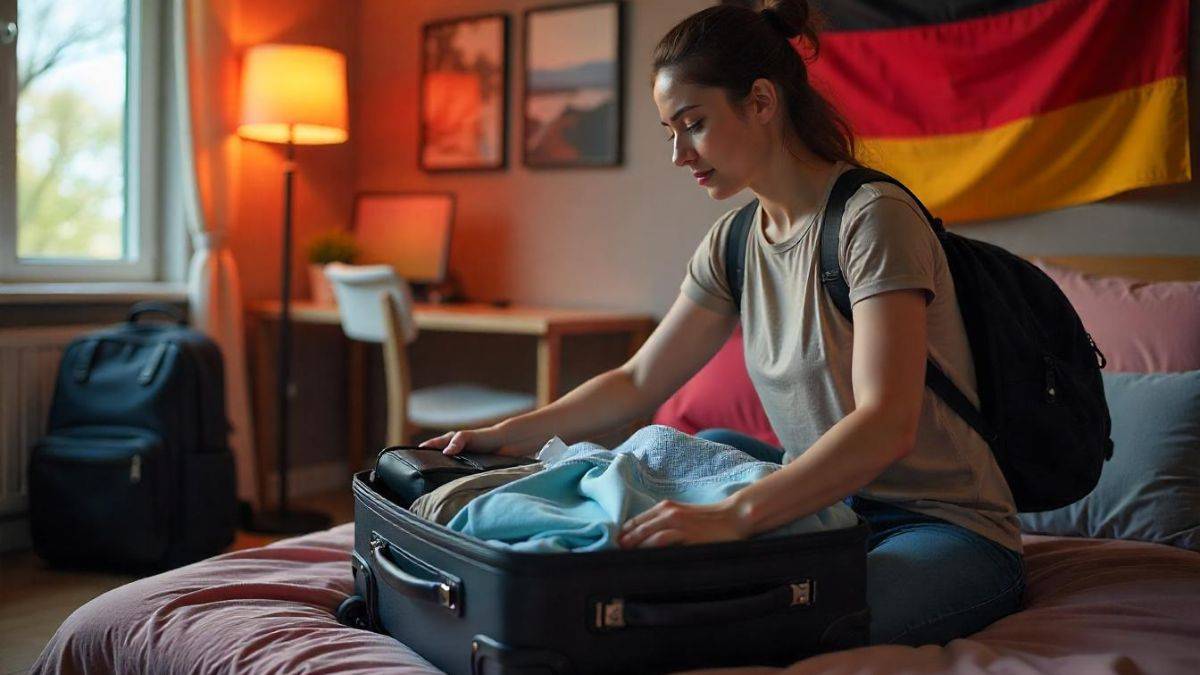Top Student Checklist Before Moving to Germany
Studying abroad in Germany is nice, but it is a good idea to know a few things before heading there. If you planned ahead, your study in Germany will go smoothly and be more fun. This guide will help you get ready and minimise last minute panic.
Moving to Germany for study is an exciting but challenging. With top universities, affordable education, and a lively student life, Germany is one of the most popular study abroad destinations. Before you pack your bags, steps must be taken to make transition easier. From getting Germany student visa and residence permit to setting up blocked account and finding student housing is important. In this article there are few things you should do before moving to Germany.
- Try to Secure Your Accommodation Early
- Learn German Before You Reach Germany
- Learn Some Cooking Skills
- Financial Preparation for Travel to Germany
- Take All Documents and Copies
Try to Secure Your Accommodation Early
Finding student accommodation in Germany is important and often most challenging. If you are looking for living space in major cities like Berlin, Munich, or Frankfurt you may have to put extra efforts. Demand for affordable housing is high so student accommodations can get booked in advance. As per rule, proof of accommodation is required for your German student visa application.
Where to Start
- Apply for student dormitories immediately after getting your admission offer letter.
- Dorms are cheaper, more connected to universities and closer to superstores. The problem is that the waiting lists are longer.
- Search for shared apartments on trusted sites. Join groups to connect with current students.
Never send money without seeing the apartment or verifying contract. Ask someone in the city or university to check accommodation if you cannot visit yourself. If its good to be true, it is a scam.
Learn German Before You Reach Germany
Even if you are enrolled in an English taught programs, learning German can be helpful
- For everyday conversations, dealing with official procedures will make life in Germany easier.
- Increases your chances of finding part time jobs in Germany as a student
- Helps you communicate at local or government offices.
- Makes it easier to understand rental contracts and university paperwork
- Helps you know German culture and build friendships
Where to Learn Free
Apps like Duolingo, DW Learn German, and YouTube German lessons. Check if your German university offers free German language classes, even if your program is in English. Focus on
- Daily used phrases, greetings for small talk
- Vocabulary related to shopping, banking, studies and public transport
- Reading and understanding rental contracts and official letter
- Learning German cannot happen overnight.
Learn Some Cooking Skills
Eating out in Germany can be expensive. Knowing how to cook simple meals is a survival skill and help you save some money.
Predict your IELTS, TOEFL, and PTE in just 4 steps!
- Learn basic dishes (based on preference)
- Learn to cook in small portions
- Master batch cooking to prep meals for a day and then week.
- Self cooking can help you eat healthier.
- You can cook together also with other flat mates.
Financial Preparation for Travel to Germany
Setting up your blocked account for German visa to having cash on arrival, money needs early attention.
a. Blocked Account and Health Insurance
In 2025, the minimum required blocked account amount is €11,904. Choose a safe, reliable, and recognised provider as given by German Foreign Office.
Why We Recommend Expatrio
- Full €69 blocked account setup fee refunded
- Free incoming health insurance worth €95 for visa
- Up to €90 cashback with TK Flex health insurance
- Free German bank account and digital ISIC student ID
- Instant payouts with Apple/Google Pay compatibility
- Student loans available through tie up with ICICI Bank in India
b. Carry Cash for Initial Spending
You will need atleast €500 to €600 when you land in Germany to help you with
- Public transport passes
- Initial groceries and SIM card
- Emergency expenses
Always keep your cash in hand and store it safely during travel.
Take All Documents and Copies
Digital copies will not be enough. You should have original and hard copies when you go for city registration, visa appointments and university enrollment. Documents you must take with you to Germany are
| Passport and visa |
Admission letter and enrollment proof |
Blocked account confirmation |
| Health insurance certificate |
Academic certificates and transcripts |
Birth certificate |
| Passport-size photos (white background, matte finish) |
Medical prescriptions and history |
COVID vaccination proof, if required |
Take all steps seriously and then go ahead to study and live in Germany.
Yes, carry about €500–€600 in cash for your first few days. Many places still prefer cash, especially for public transport, initial groceries, or SIM card purchases.
Key documents include:
Passport and visa
University admission letter
Blocked account confirmation
Health insurance
Academic transcripts
Passport photos
Birth certificate
Medical prescriptions
Always carry originals and 2–3 photocopies in waterproof folders.
Pick your stage and get free guidance from counsellors who've helped thousands get into top universities.
 Starting research
Starting research Shortlisting colleges
Shortlisting colleges Exam preparation
Exam preparation SOP/LOR writing
SOP/LOR writing Scholarship & finance
Scholarship & finance Visa application
Visa application


Yes, learning basic German is highly recommended. It helps you with daily tasks, part-time jobs, reading contracts, and dealing with government offices. It also helps you integrate socially and culturally.